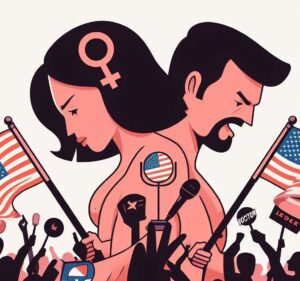In the world of politics, gender and sexual discrimination persist as a silent yet formidable adversary. It forms hidden barriers that inhibit the fair representation of diverse backgrounds and perspectives. Understanding and addressing this issue is crucial in our uncompromising quest for true democracy.
Background

Historically speaking, politics has been a space dominated almost entirely by heterosexual men. The realm of political leadership and decision-making was widely regarded as a male preserve, with individuals of different genders and sexual orientations being largely marginalized. This set up an environment where discrimination was not only commonplace but often institutionalized as well. Women, members of the LGBTQ+ community, and others who fell outside the heterosexual male spectrum frequently endured both covert and overt forms of discrimination, which led to restricted opportunities, overlooked contributions, and suppressed voices.
This norm has always been challenged by resilient trailblazers who dared to break through these barriers to make history. Notable examples include Sirimavo Bandaranaike, who became the world’s first female prime minister when she took office in Ceylon (now Sri Lanka) in 1960. Her journey was marked by numerous trials and tribulations, but she managed to rise above them and set a precedent for future generations of female leaders.
In the United States, Harvey Milk emerged as a beacon for the LGBTQ+ community as the first openly gay individual to be elected to public office in California. His time in office was short but impactful as he championed for the rights and recognition of the gay community. Unfortunately, his tenure ended tragically, when he was assassinated, underlining the significant risks faced by those challenging norms.
These figures were exceptions in a largely homogeneous political landscape and had to act against swirling currents of bias and discrimination. Their journey to political leadership was far more arduous due to their gender identity or sexual orientation. Their stories of perseverance represent multiple lived experiences of struggle and resilience among many individuals outside the heteronormative scope. Their legacy continues to inspire and pave the way for a future with more inclusive and representative political systems.
Impact of Discrimination in Politics
The implications of discrimination in politics are far-reaching and can severely hamper the development of a truly equitable society. The clearest consequence of this discrimination is a limited diversity in policy-making and political discourse. A political arena dominated by specific groups inevitably caters to the interests and perspectives of those groups, often marginalizing or completely overlooking the needs and perspectives of others. This lack of diversity in representation affects the population at large, particularly those who belong to minority groups, as policies enacted may not adequately address their unique challenges or even recognise their existence.
When policy-making tables lack diversity, the result is a one-dimensional outlook that fails to reflect the rich, multi-dimensional fabric of the society it purports to represent. For instance, issues such as women’s health and safety, LGBTQ+ rights, and intersectionality may be neglected or poorly handled if decisions are made mostly by individuals who have never personally experienced such challenges.
The specter of discrimination discourages many capable and committed individuals from running for public office. Potential leaders who could offer fresh perspectives and transformative ideologies often choose not to participate in the political sphere due to fear of prejudice, discriminatory tendencies, and the potential personal and professional damage that could result from these biases. They may also be dissuaded by the underrepresentation of leaders who share their identities, further reducing the diversity of the political landscape.
The perpetuation of this bias reinforces societal stereotypes about leadership. When the vast majority of leaders fit into a specific demographic profile, it tacitly communicates the notion that leadership is restricted to those demographics perpetuating a cycle of exclusion and misrepresentation. Young people from underrepresented groups may internalise these biases, resulting in a diminished sense of self-efficacy and ambition, thereby undermining their political participation in the future.
Current Policies and Regulations

Over the years, numerous countries have recognized the importance of diversity and representation in politics, thereby adopting laws and regulations aimed at combating gender and sexual discrimination. These laws usually aim to create a level playing field for all individuals, regardless of their gender or sexual orientation.
One commonly used tool employed for this purpose is the implementation of legal quotas for women’s representation in politics. This includes reserved seats in parliaments, legislatures, and other political bodies that are specifically earmarked for women. These quotas help ensure that women have a voice in the policymaking process, which in turn prompts more gender-responsive legislation and breaks societal stereotypes about women’s capacity for leadership.
The real impact of such quota systems can be highly variable. They can produce significant changes in some contexts, but in others, they may only result in symbolic representation without any real power. Factors like the prevalence of patriarchal norms, the respect for rule of law, and the overall political climate can significantly affect the effectiveness of these laws.
Besides quotas, anti-discriminatory laws also play a crucial role in promoting political equality. These laws provide protection against gender and sexual orientation discrimination in areas such as candidate selection, party membership, and the conduct of public office holders.
While the implementation of legal quotas and anti-discriminatory laws marks a notable step towards the right direction, there is still room for improvement. A unified, systemic, and decisive action at both international and national levels is essential to create a global political sphere that is truly equitable and inclusive. This would likely involve harmonizing the rules and practices across countries, devising stronger mechanisms for enforcement, and undertaking sustained efforts to challenge and change discriminatory cultural norms.
